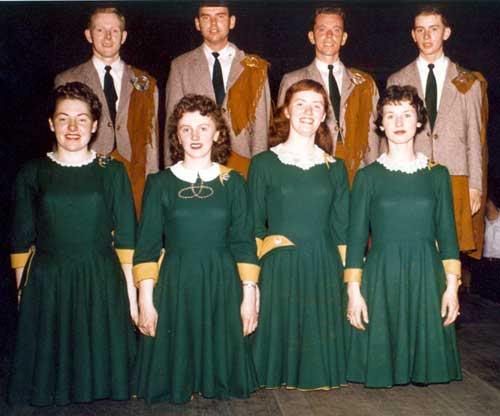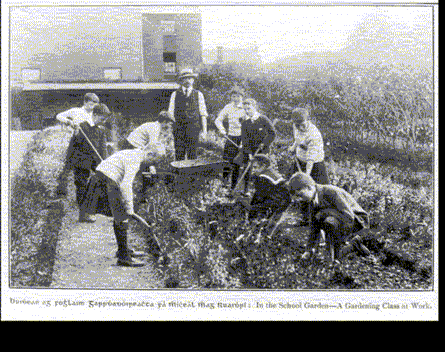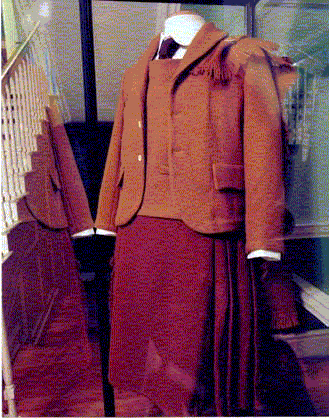|
-
10th July 09, 06:08 PM
#91
Out of the mouth of an Irish History Buff!
http://www.youtube.com/watch?v=zwwMf5Et_tA
----------------------------------------------[URL="http://www.youtube.com/sirdaniel1975"]
My Youtube Page[/URL]
-
-
10th July 09, 06:11 PM
#92
 Originally Posted by Terry

Logically, one would assume the Irish introduced Celtic culture to Scotland, rather than the reverse. The indiginous people of Scotland were the Picts, not Celts. The Celts migrated to Scotland from Ireland....Game, set, match!
The Scoti were one of many iron age tribes spread throughout Europe who spoke a celtic language-- the cultural aspect of the Celtic speaking tribes in what is now central Turkey was probably quite different than that of the Celtic speaking Scoti.
In all likelihood the Scoti absorbed as many aspects of the indigenous Pictish culture as they retained from Ireland, and this synthesized into a proto-Scottish culture, which was itself shaped and influenced by closer contact with the cultural groups to the south, in what is now modern day England.
If any one event is necessary to show a significant cultural difference between the Scottish Highlanders and the Irish, that event would be the Protestant reformation, and the relative willingness of the Highlanders to abandon Roman Catholicism and embrace Protestantism.
While there are cultural similarities between the Highlanders and the Scots in the late 16th century, there are also significant differences-- the development of the Highland kilt being but one of many.
-
-
10th July 09, 06:49 PM
#93
If any one event is necessary to show a significant cultural difference between the Scottish Highlanders and the Irish, that event would be the Protestant reformation, and the relative willingness of the Highlanders to abandon Roman Catholicism and embrace Protestantism.
I would agree to a point, Scott -- if I remember correctly, Presbyterianism didn't make inroads into the Highlands until the late 18th/early 19th century; many Highlanders at the time of the '45, for example, were Roman Catholic, and quite a few were Episcopalian.
Regards,
Todd
-
-
10th July 09, 07:06 PM
#94
-
-
10th July 09, 07:53 PM
#95
The kilt originated in Scotland.
Invention is almost always taking one thing and changing it a little or using it in a new way. That's been the course of human history from the cave days to today.
I have seen nothing here to change my mind that the kilt evolved from the leine and/or brat. In fact, if the kilt evolved from a plaid, surely the plaid evolved from the brat?
Nothing springs forth from nowhere.
Everyone keeps asking for proof of 'Irish claims.' Is there proof that the kilt evolved from something other than the leine and brat the Scotii wore before the kilt?
And I think some of the discussion is at cross purposes. Some argue that the kilt is now ALSO an Irish garment and the rebuttal is that the kilt originated in Scotland.
Aside from traditional values, is there a reason the Irish should not choose the kilt as a cultural garment, as many Irish have done for about 100 years?
Repeat, "the kilt originated in Scotland."
It is being gradually accepted as a Celtic garment by other Celtic peoples. I think much of the debate is in trying to keep the kilt solely Scottish and it's far too late for that. The more popular kilts become, the less they will be remembered as Scottish. I think we can see that far ahead. They will always be originally from Scotland, but the mystique will fade in the coming years as kilts become accepted as suitable daily wear for men of all cultures.
I'm not saying that's necessarily a good thing. I just see things headed that way.
-
-
10th July 09, 08:34 PM
#96
As a Northerner and native West-Coaster, it doesn't bother me
 Originally Posted by Jock Scot

There is a name that is used here in the UK as a collective noun to specify those from the USA. As youngsters we were told pretty firmly not to call the GI's it(we did though), and I am never sure if it causes offence or not, I don't think it does, although I can see a historical problem between certain states of the USA, perhaps you chaps from the USA could enlighten me? The word used, is the description of pulling sharply on a piece of rope. Yes? Got it? Of course you have! 
I prefer Yank to "Jerk" another term that could be used for pulling sharply on a piece of rope. The old song "Over There" with the line "The Yanks are coming, the Yanks are coming" never bothered me. Now those from the South who also fought and lost lives in WWII might take offense.
I think in general most of us prefer American or British Ex-Patriots :-)
A proud Great-Great Grandson of the Clan MacLellan from Kirkcudbright.
"Think On!"
-
-
10th July 09, 09:08 PM
#97
 Originally Posted by Jock Scot

There is a name that is used here in the UK as a collective noun to specify those from the USA. As youngsters we were told pretty firmly not to call the GI's it(we did though), and I am never sure if it causes offence or not, I don't think it does, although I can see a historical problem between certain states of the USA, perhaps you chaps from the USA could enlighten me? The word used, is the description of pulling sharply on a piece of rope. Yes? Got it? Of course you have! 
I don't find it offensive, but then, I am of the opinion that offense is not given, but taken.
I am from the Southern US. It's often said that most of us are adults before we learn that "damn" and "Yankee" are two separate words.
I am told that my grandfather used it often and with emotion. He was born in 1865 in Alabama, just before the Civil War ended, and grew up under Reconstruction, when the South was occupied by the Union army. He remembered as a boy being pulled out of his bed at night by Yankee soldiers ransacking the house who were looking for valuables that might have been hidden in his mattress. He also never said "Republican," but "Radical," which was how the more extreme wing of the Republican Party was known before and after the Civil War.
According to this http://en.wikipedia.org/wiki/Yankee_Doodle it was a term of derison used by the British for Americans during the colonial period, and that "Yankee Doodle" was intended to mock Americans, but after the early American victories in the Revolution..."at this point the Americans embraced the song and made it their own, turning it back on those who had used it to mock them. After the Battle of Lexington and Concord, a Boston newspaper reported: "Upon their return to Boston [pursued by the Minutemen], one [Briton] asked his brother officer how he liked the tune now, — 'Dang them,' returned he, 'they made us dance it till we were tired' — since which Yankee Doodle sounds less sweet to their ears."
I had always heard that the etymology comes from the pronunciation of one of the Native American tribes in what is now the northeastern US of the word, "English." They pronounced it "Yengi."
But then I googled, and found the Wikipedia article on "Yankee." http://en.wikipedia.org/wiki/Yankee It will tell you more about the word's history and current usage than you want to know, including in which countries it is used to disparage Americans, and where it isn't.
It contains this aphorism attributed to E.B White:
"To foreigners, a Yankee is an American.
To Americans, a Yankee is a Northerner.
To Northerners, a Yankee is an Easterner.
To Easterners, a Yankee is a New Englander.
To New Englanders, a Yankee is a Vermonter.
And in Vermont, a Yankee is somebody who eats pie for breakfast."
Interestingly, there is a probable parallel etymology from the other side of the world. The Tibetan word "inji" also come from "English," and though it still strictly means "English," as in "inji kye," or "English language," sometimes it refers to a person of European descent, as in, "Do you know that inji woman who lives next door? I think she is German."
I don't know what any of this has to do with the Irish and kilts, but I think it's safe to say that kiltwearing did not originate among the Yankees.
-
-
10th July 09, 09:19 PM
#98
 Originally Posted by cajunscot

I would agree to a point, Scott -- if I remember correctly, Presbyterianism didn't make inroads into the Highlands until the late 18th/early 19th century; many Highlanders at the time of the '45, for example, were Roman Catholic, and quite a few were Episcopalian.
Regards,
Todd
I hadn't intended to imply that there was an overnight transformation, merely to point out that the reformation did take hold in the Highlands, unlike in Ireland where the population remained, by and large, RC.
-
-
10th July 09, 09:50 PM
#99
 Originally Posted by MacMillan of Rathdown

You'd be right, of course, if every Ard Feis was full to the brim with kilt wearing nationalists. But they aren't. Irish nationalists (except possibly in the three "counties" of Canada, USA, and Australia) DON'T WEAR KILTS. You would be hard pressed to find and name 100 Irish Nationalists (whatever that phrase may mean) who have worn the kilt as an expression of nationalism over the last 100 years.
Why?
Because the kilt isn't, and never has been, seen by the Irish as part of their Irish cultural tradition.
You forgot New Zealand!
Having never been a member of an Irish political party, I can’t say I’ve ever been to an Ard-Fheis to confirm whether they are a kilt-wearing rabble or not! 
You do realize that both of us resided in Ireland for a time and presumably wore kilts while we were there! So that makes at least two Irish kilties on this forum and counting… 
But Seriously, I think we can all agree that the Irish tartan kilt is a very recent idea with a history of less than twenty years. It was instigated by the introduction of Irish County tartans in the mid-1990s from the House of Edgar and later by the Irish Country Crest Range produced by Marton Mills. This was aimed, for the most part at the Irish Diaspora and ex-pat community.
I would think we can agree, however, that saffron kilts (and perhaps some other self-coloured kilts such as green) are a uniquely Irish version of the Scottish Highland kilt. They have a history of perhaps 100 years at most, and are worn by many Irish pipe bands both military and civilian. Before the Riverdance phenomena, self-coloured kilts were frequently worn in Irish dance as well.
Here are some old pictures of Irish dancers wearing kilts:
Dr John Cullinane:



Here are a couple of videos featuring Irish dancers in kilts: (Notice the younger boy wearing two brooches with his brat in the first video.)
http://www.youtube.com/watch?v=77y2fAMeKqo
http://www.youtube.com/watch?v=iniYyJz6y7A
Here are some pictures of Irish pipe bands wearing kilts:


Here are a few more kilt-related old pictures:
Boys working in the garden at St. Enda's school

A picture a St. Enda's School uniform:

Basically I see this all as a history of the marketing of the kilt. It can be broken down into three stages:
1) The introduction of the Highland kilt to the Scottish Lowlands. (early to mid 19th Century)
2) The introduction of the now pan-Scottish kilt to Ireland (early 20th Century)
3) The introduction of tartan Celtic-themed kilts to the world (late 20th Century.)
In all, I would say it is a good example of the fine enterprising skills of Scottish weavers and kilt makers!
[B][COLOR="DarkGreen"]John Hart[/COLOR]
Owner/Kiltmaker - Keltoi
-
-
11th July 09, 04:22 AM
#100
 Originally Posted by MacMillan of Rathdown

I hadn't intended to imply that there was an overnight transformation, merely to point out that the reformation did take hold in the Highlands, unlike in Ireland where the population remained, by and large, RC.
Interestingly, there still appears to be a significant Roman Catholic population in Scotland with an estimated 800,00 members representing approximately 16 % of Scotland's total population. Numerically, Roman Catholicism is the 2nd most practiced religion in Scotland.
The Church of Scotland is the most widely practiced religion, with an estimated 2,146,251 members representing 42% of the population.
All other Christian religions combined account for 6.8% of Scotland's population.
-
Similar Threads
-
By Mr. Kilt in forum General Kilt Talk
Replies: 209
Last Post: 26th August 09, 06:10 PM
-
By Big Homestead in forum General Kilt Talk
Replies: 38
Last Post: 2nd October 07, 09:05 PM
-
By JayFilomena in forum General Kilt Talk
Replies: 7
Last Post: 18th July 06, 01:21 AM
-
By minimalistix in forum Miscellaneous Forum
Replies: 3
Last Post: 30th November 05, 01:59 PM
-
By Donnie in forum Traditional Kilt Wear
Replies: 8
Last Post: 9th March 04, 04:40 AM
 Posting Permissions
Posting Permissions
- You may not post new threads
- You may not post replies
- You may not post attachments
- You may not edit your posts
-
Forum Rules
|
|
Bookmarks